Answered step by step
Verified Expert Solution
Question
1 Approved Answer
Elijah Gold and His Restaurant Elijah Gold knew exactly what to expect. He knew how his employees felt about him. That's why he had
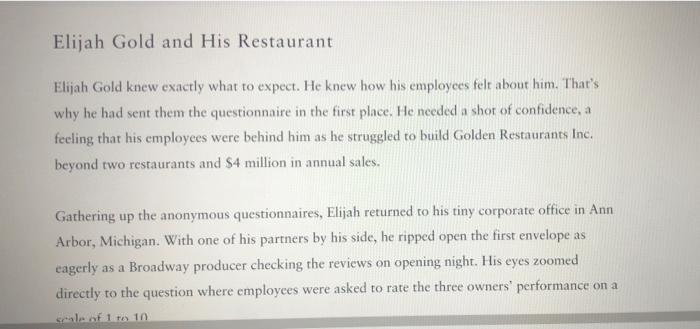
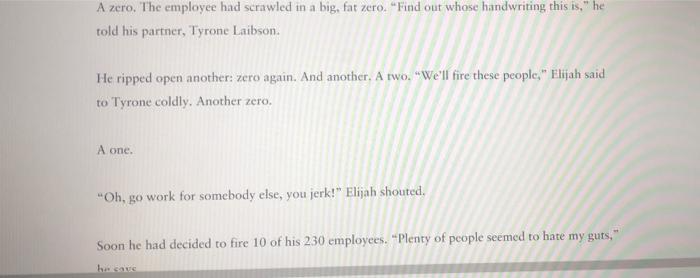
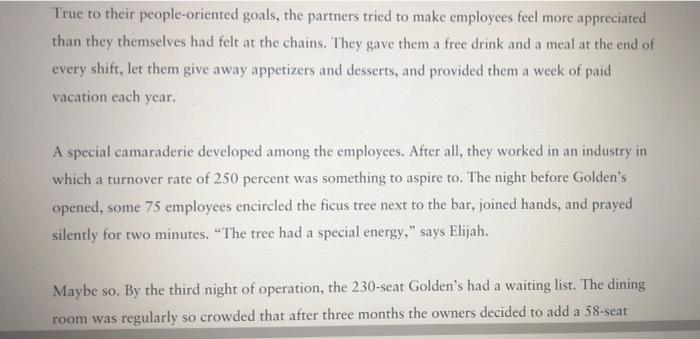
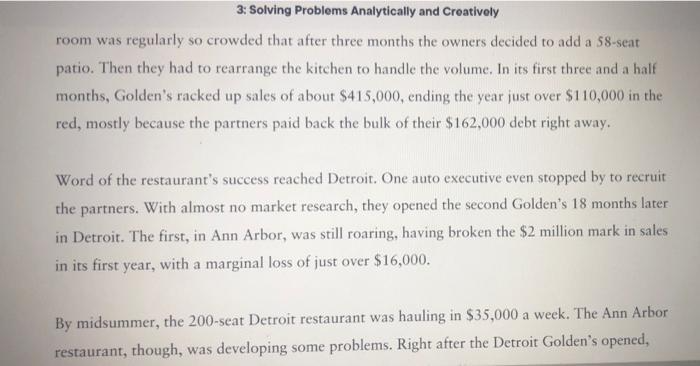
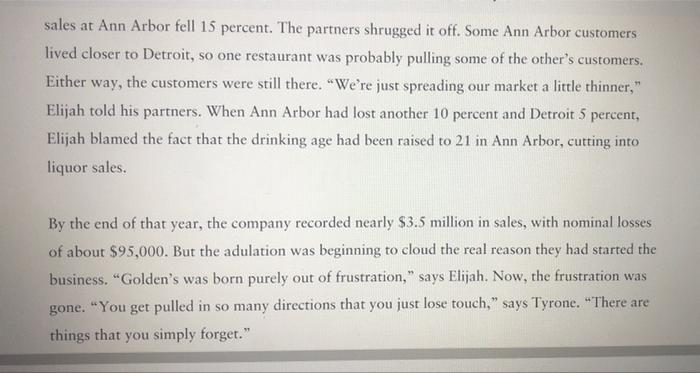
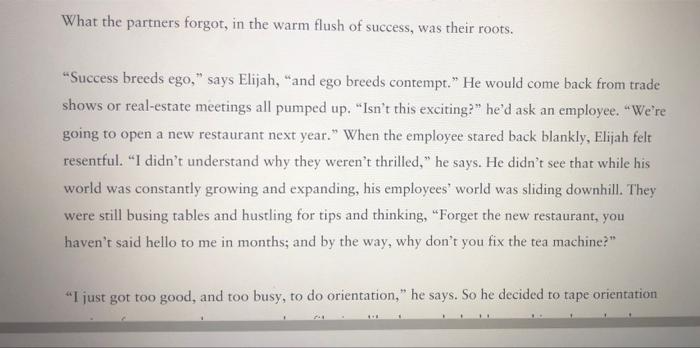
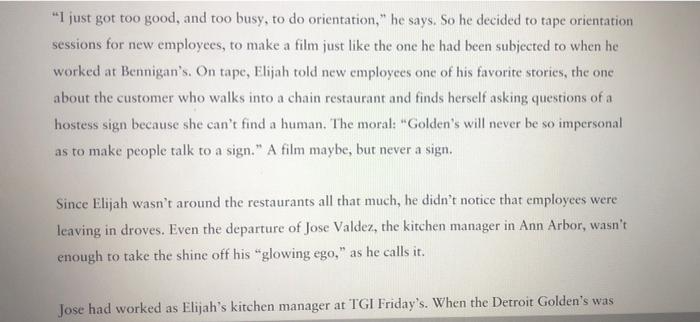
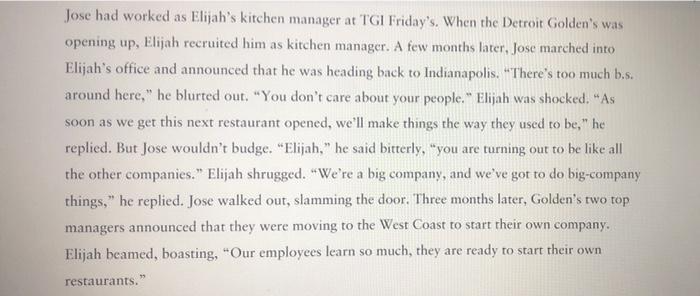
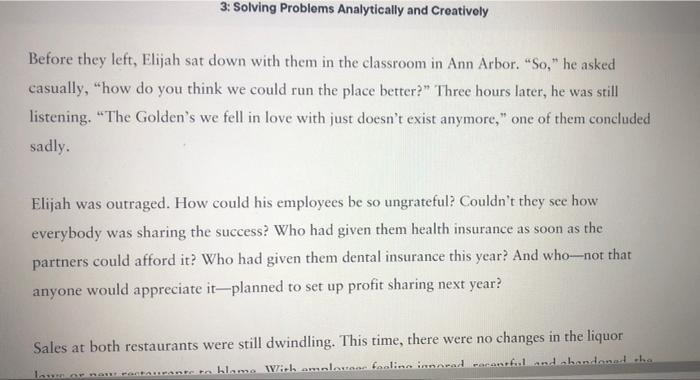
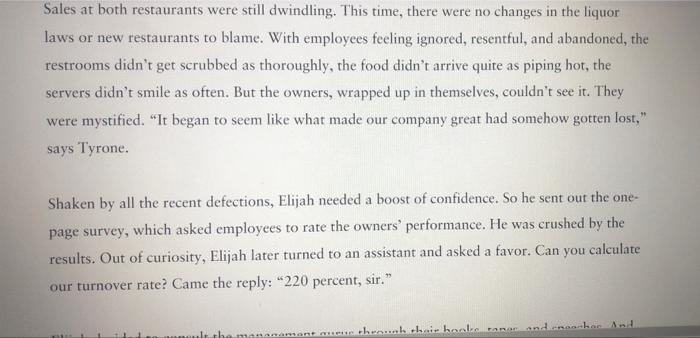
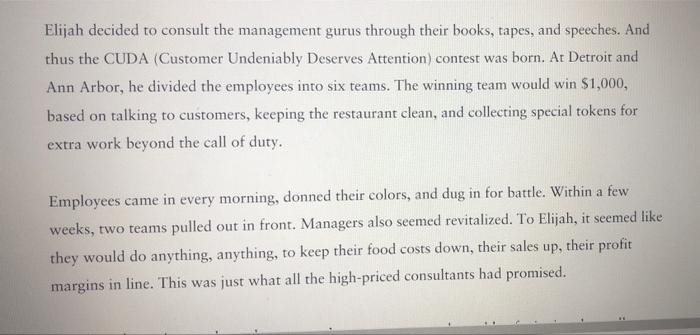
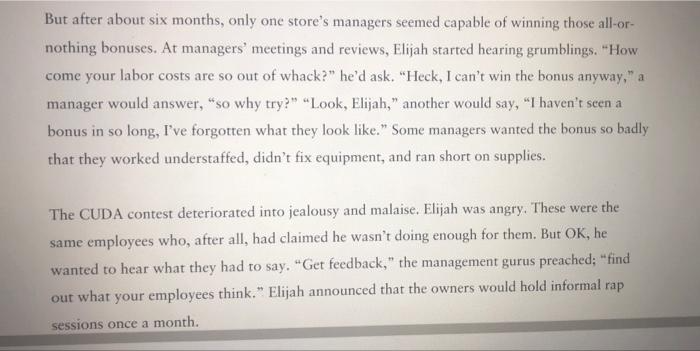

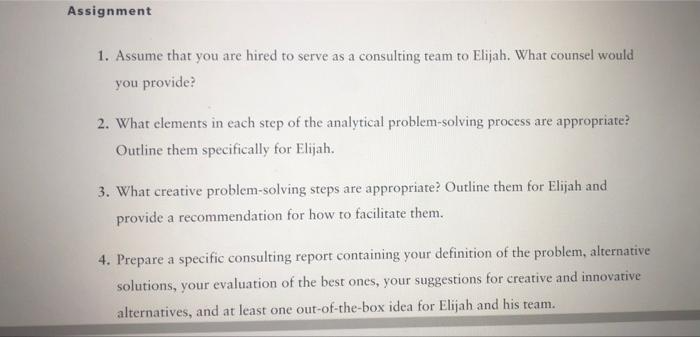
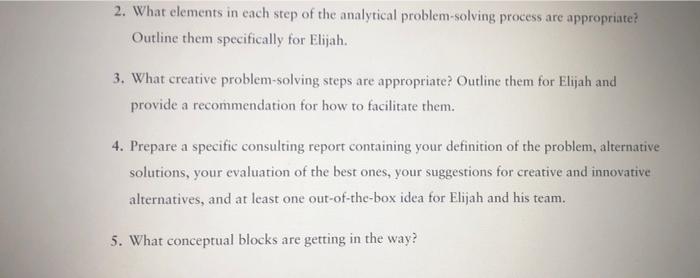
Elijah Gold and His Restaurant Elijah Gold knew exactly what to expect. He knew how his employees felt about him. That's why he had sent them the questionnaire in the first place. He needed a shot of confidence, a feeling that his employees were behind him as he struggled to build Golden Restaurants Inc. beyond two restaurants and $4 million in annual sales. Gathering up the anonymous questionnaires, Elijah returned to his tiny corporate office in Ann Arbor, Michigan. With one of his partners by his side, he ripped open the first envelope as eagerly as a Broadway producer checking the reviews on opening night. His eyes zoomed directly to the question where employees were asked to rate the three owners' performance on a scale of 1 to 10 A zero. The employee had scrawled in a big, fat zero. "Find out whose handwriting this is," he told his partner, Tyrone Laibson. He ripped open another: zero again. And another. A two. "We'll fire these people," Elijah said to Tyrone coldly. Another zero. A one. "Oh, go work for somebody else, you jerk!" Elijah shouted. Soon he had decided to fire 10 of his 230 employees. "Plenty of people seemed to hate my guts," he cave True to their people-oriented goals, the partners tried to make employees feel more appreciated than they themselves had felt at the chains. They gave them a free drink and a meal at the end of every shift, let them give away appetizers and desserts, and provided them a week of paid vacation each year. A special camaraderie developed among the employees. After all, they worked in an industry in which a turnover rate of 250 percent was something to aspire to. The night before Golden's opened, some 75 employees encircled the ficus tree next to the bar, joined hands, and prayed silently for two minutes. "The tree had a special energy," says Elijah. Maybe so. By the third night of operation, the 230-seat Golden's had a waiting list. The dining room was regularly so crowded that after three months the owners decided to add a 58-seat 3: Solving Problems Analytically and Creatively room was regularly so crowded that after three months the owners decided to add a 58-seat patio. Then they had to rearrange the kitchen to handle the volume. In its first three and a half months, Golden's racked up sales of about $415,000, ending the year just over $110,000 in the red, mostly because the partners paid back the bulk of their $162,000 debt right away. Word of the restaurant's success reached Detroit. One auto executive even stopped by to recruit the partners. With almost no market research, they opened the second Golden's 18 months later in Detroit. The first, in Ann Arbor, was still roaring, having broken the $2 million mark in sales in its first year, with a marginal loss of just over $16,000. By midsummer, the 200-seat Detroit restaurant was hauling in $35,000 a week. The Ann Arbor restaurant, though, was developing some problems. Right after the Detroit Golden's opened, sales at Ann Arbor fell 15 percent. The partners shrugged it off. Some Ann Arbor customers lived closer to Detroit, so one restaurant was probably pulling some of the other's customers. Either way, the customers were still there. "We're just spreading our market a little thinner," Elijah told his partners. When Ann Arbor had lost another 10 percent and Detroit 5 percent, Elijah blamed the fact that the drinking age had been raised to 21 in Ann Arbor, cutting into liquor sales. By the end of that year, the company recorded nearly $3.5 million in sales, with nominal losses of about $95,000. But the adulation was beginning to cloud the real reason they had started the business. "Golden's was born purely out of frustration," says Elijah. Now, the frustration was gone. "You get pulled in so many directions that you just lose touch," says Tyrone. "There are things that you simply forget." What the partners forgot, in the warm flush of success, was their roots. "Success breeds ego," says Elijah, "and ego breeds contempt." He would come back from trade shows or real-estate meetings all pumped up. "Isn't this exciting?" he'd ask an employee. "We're going to open a new restaurant next year." When the employee stared back blankly, Elijah felt resentful. "I didn't understand why they weren't thrilled," he says. He didn't see that while his world was constantly growing and expanding, his employees' world was sliding downhill. They were still busing tables and hustling for tips and thinking, "Forget the new restaurant, you haven't said hello to me in months; and by the way, why don't you fix the tea machine?" "I just got too good, and too busy, to do orientation," he says. So he decided to tape orientation "I just got too good, and too busy, to do orientation," he says. So he decided to tape orientation sessions for new employees, to make a film just like the one he had been subjected to when he worked at Bennigan's. On tape, Elijah told new employees one of his favorite stories, the one about the customer who walks into a chain restaurant and finds herself asking questions of a hostess sign because she can't find a human. The moral: "Golden's will never be so impersonal as to make people talk to a sign." A film maybe, but never a sign. Since Elijah wasn't around the restaurants all that much, he didn't notice that employees were leaving in droves. Even the departure of Jose Valdez, the kitchen manager in Ann Arbor, wasn't enough to take the shine off his "glowing ego," as he calls it. Jose had worked as Elijah's kitchen manager at TGI Friday's. When the Detroit Golden's was Jose had worked as Elijah's kitchen manager at TGI Friday's. When the Detroit Golden's was opening up, Elijah recruited him as kitchen manager. A few months later, Jose marched into Elijah's office and announced that he was heading back to Indianapolis. "There's too much b.s. around here," he blurted out. "You don't care about your people." Elijah was shocked. "As soon as we get this next restaurant opened, we'll make things the way they used to be," he replied. But Jose wouldn't budge. "Elijah," he said bitterly, "you are turning out to be like all the other companies." Elijah shrugged. "We're a big company, and we've got to do big-company things," he replied. Jose walked out, slamming the door. Three months later, Golden's two top managers announced that they were moving to the West Coast to start their own company. Elijah beamed, boasting, "Our employees learn so much, they are ready to start their own restaurants. 3: Solving Problems Analytically and Creatively Before they left, Elijah sat down with them in the classroom in Ann Arbor. "So," he asked casually, "how do you think we could run the place better?" Three hours later, he was still listening. "The Golden's we fell in love with just doesn't exist anymore," one of them concluded sadly. Elijah was outraged. How could his employees be so ungrateful? Couldn't they see how everybody was sharing the success? Who had given them health insurance as soon as the partners could afford it? Who had given them dental insurance this year? And who-not that would appreciate it-planned to set up profit sharing next year? anyone Sales at both restaurants were still dwindling. This time, there were no changes in the liquor lawn or now restaurants to blame With amalovane foaling innnrad racantful and abandoned the Sales at both restaurants were still dwindling. This time, there were no changes in the liquor laws or new restaurants to blame. With employees feeling ignored, resentful, and abandoned, the restrooms didn't get scrubbed as thoroughly, the food didn't arrive quite as piping hot, the servers didn't smile as often. But the owners, wrapped up in themselves, couldn't see it. They were mystified. "It began to seem like what made our company great had somehow gotten lost," says Tyrone. Shaken by all the recent defections, Elijah needed a boost of confidence. So he sent out the one- page survey, which asked employees to rate the owners' performance. He was crushed by the results. Out of curiosity, Elijah later turned to an assistant and asked a favor. Can you calculate our turnover rate? Came the reply: "220 percent, sir." nonsult the ananamant mene through their hooks range and nonchoe And Elijah decided to consult the management gurus through their books, tapes, and speeches. And thus the CUDA (Customer Undeniably Deserves Attention) contest was born. At Detroit and Ann Arbor, he divided the employees into six teams. The winning team would win $1,000, based on talking to customers, keeping the restaurant clean, and collecting special tokens for extra work beyond the call of duty. Employees came in every morning, donned their colors, and dug in for battle. Within a few weeks, two teams pulled out in front. Managers also seemed revitalized. To Elijah, it seemed like their profit they would do anything, anything, to keep their food costs down, their sales margins in line. This was just what all the high-priced consultants had promised. up, But after about six months, only one store's managers seemed capable of winning those all-or- nothing bonuses. At managers' meetings and reviews, Elijah started hearing grumblings. "How come your labor costs are so out of whack?" he'd ask. "Heck, I can't win the bonus anyway," a manager would answer, "so why try?" "Look, Elijah," another would say, "I haven't seen a bonus in so long, I've forgotten what they look like." Some managers wanted the bonus so badly that they worked understaffed, didn't fix equipment, and ran short on supplies. The CUDA contest deteriorated into jealousy and malaise. Elijah was angry. These were the same employees who, after all, had claimed he wasn't doing enough for them. But OK, he wanted to hear what they had to say. "Get feedback," the management gurus preached; "find out what your employees think." Elijah announced that the owners would hold informal rap sessions once a month. sessions once a month. "This is your time to talk," Elijah told the employees who showed up all three of them. That's how it was most times, with three to five employees in attendance, and the owners dragging others away from their jobs in the kitchen. Nothing was sinking in, and Elijah knew it. He decided to hire a consulting team from a university to advise him. Assignment 1. Assume that you are hired to serve as a consulting team to Elijah. What counsel would you provide? 2. What elements in each step of the analytical problem-solving process are appropriate? Outline them specifically for Elijah. 3. What creative problem-solving steps are appropriate? Outline them for Elijah and provide a recommendation for how to facilitate them. 4. Prepare a specific consulting report containing your definition of the problem, alternative solutions, your evaluation of the best ones, your suggestions for creative and innovative alternatives, and at least one out-of-the-box idea for Elijah and his team. 2. What elements in each step of the analytical problem-solving process are appropriate? Outline them specifically for Elijah. 3. What creative problem-solving steps are appropriate? Outline them for Elijah and provide a recommendation for how to facilitate them. 4. Prepare a specific consulting report containing your definition of the problem, alternative solutions, your evaluation of the best ones, your suggestions for creative and innovative alternatives, and at least one out-of-the-box idea for Elijah and his team. 5. What conceptual blocks are getting in the way?
Step by Step Solution
There are 3 Steps involved in it
Step: 1
Consulting Report for Elijahs Restaurant 1 Counsel to Elijah Elijah as you have asked for our consultancy for your restaurant here are the general areas we would advise you to focus on Operations and ...
Get Instant Access to Expert-Tailored Solutions
See step-by-step solutions with expert insights and AI powered tools for academic success
Step: 2

Step: 3

Ace Your Homework with AI
Get the answers you need in no time with our AI-driven, step-by-step assistance
Get Started


